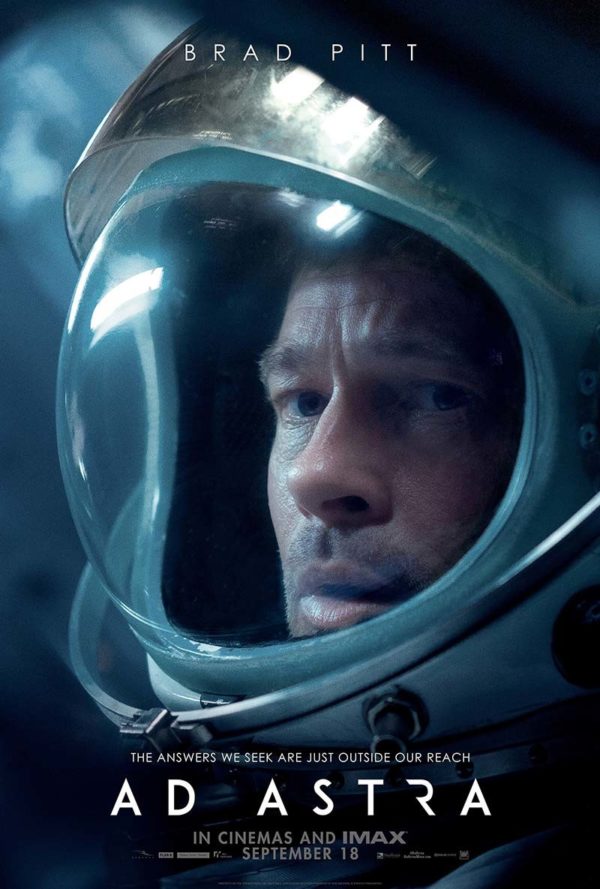Ad Astra, 2019.
Directed by James Gray.
Starring Brad Pitt, Tommy Lee Jones, Donald Sutherland, Ruth Negga, Liv Tyler, John Ortiz, Greg Bryk, Kimberly Elise, Loren Dean, John Finn, Donnie Kershawarz, Justin Dray, Sasha Compère and Natasha Lyonne.
SYNOPSIS:
Astronaut Roy McBride (Brad Pitt) travels to the outer edges of the solar system to find his missing father and unravel a mystery that threatens the survival of our planet. His journey will uncover secrets that challenge the nature of human existence and our place in the cosmos.

It’d be foolish to expect a filmmaker of James Gray’s singularity – pardon the pun – to take a hard-left into card-carrying genre fare with his sci-fi debut, even noting the obvious compromises that come with mounting a $90 million CGI-heavy tentpole.
But there’s an unmistakable schizophrenia at the heart of Ad Astra, Gray’s seventh film and by far his biggest-budgeted to date – more expensive than most of his prior films combined, in fact. On one hand this is a minimalist sci-fi sortie – as minimalist as one of this scale can be, anyway – about the unforgiving emptiness of both person and space, and on the other an unexpectedly familiar man-on-a-mission movie peppered with shrewdly-placed high-concept set-pieces, led by a compulsively engaging A-lister.
It’s easy to imagine Ad Astra being a film that intrigues many though truly enrapts few, committing fully to neither a spare, philosophical through-line nor the crowd-pleasing-yet-smart warmth of, say, Ridley Scott’s deliciously populist The Martian. This is a film that wants to have its cake and eat it too, and rather like Gray’s We Own the Night – a similar Genre Film with “art-house” trimmings – the results frequently bemuse in ways both interesting and frustrating.
Following the arrival of cataclysmic worldwide energy bursts on Earth, referred to as “The Surge,” astronaut Roy McBride (Brad Pitt) is recruited to visit the outer edges of the Solar System and track down his father, Clifford (Tommy Lee Jones), who has been working on a top-secret space project that may hold the key to the origins of The Surge. But of course, Roy encounters far more than he bargained for.

It would surely be glibly reductive to call Gray’s film “Apocalypse Now in space,” though it’s certainly an invocation which draws attention to itself throughout – though I’ll keep specifics about that to a minimum. Much like Coppola’s masterpiece, Gray wants to walk a delicate line between relishing cutting-edge, style-conscious set-pieces and underlining the humanity that so often gets lost in the effects-heavy shuffle.
Gray is thankfully equipped with one not-so-secret weapon, and that’s Brad Pitt, who gives one of his most impressively restrained performances to date. Roy is a guarded, internalised character for much of the movie, touting a stoicism not unlike that of Ryan Gosling’s reserved rendition of Neil Armstrong in last year’s riveting First Man, and Pitt nimbly makes Roy terse while still nodding to the man’s internal turmoil. It’s not much of a spoiler to say that this eventually boils over and Pitt, the wily vet, is more than up to the task, fully anchoring Gray’s film in the process.
And even as pure spectacle, Ad Astra is a high-class one, girded by first-rate visual effects, cinematography and sound design throughout, the former proving especially impressive in their abundance considering the modest-ish budget for a project of this kind. An early lunar buggy chase on the Moon, for example, is a stupendously crafted thrill-ride that never forgets the danger posed to Roy and his fellow riders, and better still, underlines the fact that just as humanity battles over resources on Earth, they’re too destined to do it wherever they settle next.
It’s a shame, however, that like every good and big idea in the movie, this thematic is trampled over by an infuriatingly over-eager voiceover narration from Pitt’s Roy. His musings about life, the universe and everything are so insistently heavy-handed as to feel mandated by a panic-stricken studio following iffy test screenings, denying switched-on audiences the opportunity to figure out basically anything for themselves.

And it’s at this point that Gray’s push-and-pull between minimalism and populism becomes most evident; there are almost comically urgent set-pieces that launch virtually out of nowhere as if to ensure mainstream audiences don’t tune out, pitted against Gray’s clearly genuine desire to say something fresh about our obsessive search for life beyond the confines of humanity. The portentous high-mindedness of these thoughtful moments don’t always mesh with the more stock action segments, in large part because Gray’s film is so utterly unwilling to embrace its fundamental silliness.
Roy’s various stop-offs during his mission lead to set-pieces that, were they not so well-executed, wouldn’t feel amiss in a more conventional studio blockbuster. The aforementioned Moon chase is basically beyond reproach, but act three serves up some tentpole-baiting sequences, including a last-minute dash away from an explosion that couldn’t seem more contrived, and another escape beat so daft it instantly reminds one of the infamously credibility-straining fire extinguisher scene from Gravity.
Were Gray not so stridently self-serious in his approach, perhaps these moments wouldn’t jar quite so violently, but they best represent the film’s own internal struggle and identity crisis, and it’ll be interesting to see how audiences en masse resolve that.
But as a holistic experience, Ad Astra does constantly entertain and intrigue, propelled forward by a magnetic Pitt, a crackerjack supporting cast – especially Donald Sutherland, Tommy Lee Jones and Ruth Negga – and an admirable desire to do something tonally unique with the sci-fi movie. It doesn’t always work, and viewers on both sides of the fence will likely wish Gray had batted harder for a single team, yet the smart filmmaking decisions and superlative craft easily win out over the rougher edges.
Straddled between the splashy demands of blockbuster filmmaking and the methodical tendencies of its singular filmmaker, Ad Astra excels even as it can’t quite decide what it wants to be.
Flickering Myth Rating – Film: ★ ★ ★ / Movie: ★ ★ ★ ★
Shaun Munro – Follow me on Twitter for more film rambling.












